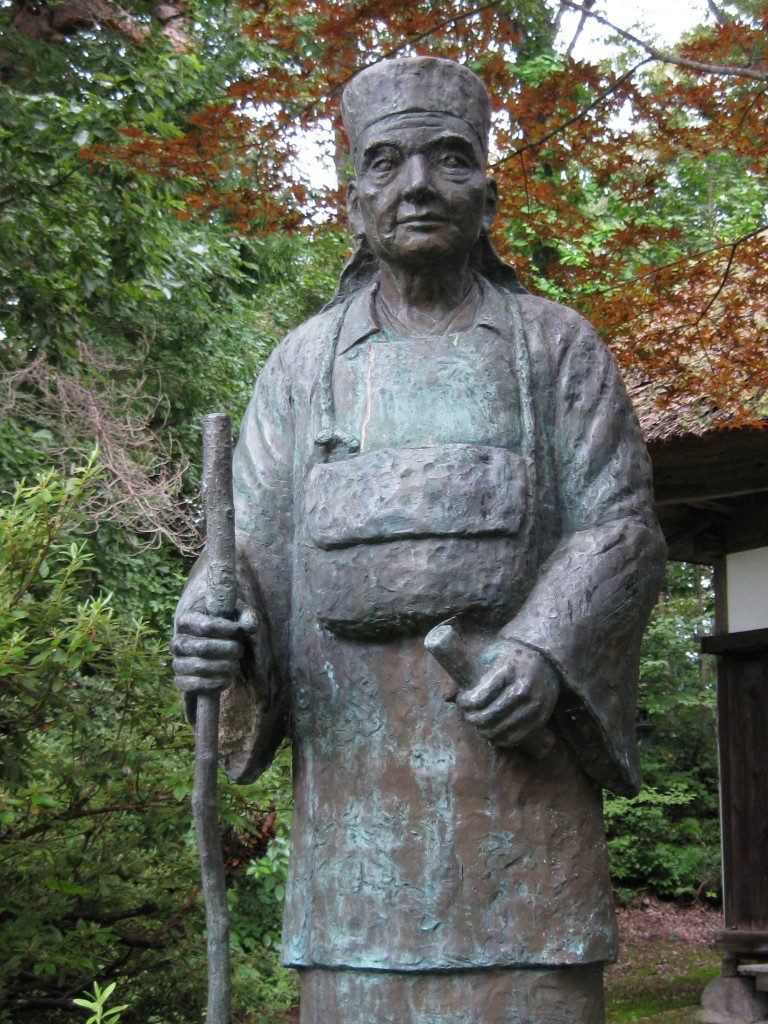
Kobayahsi Issa's statue at Kashiwabara
Today is Kobayashi Issa’s memorial day, for it was on Jan. 5 that he died. Issa (1763-1828) is known as one of the Big Four of Japanese haiku, together with Basho, Buson and Shiki.
Issa was a follower of Pure Land Buddhism, but his poetry speaks very much of the integration with nature that characterises Shinto and Japanese traditional culture. It speaks too of the wonder of life.
In the article below, Roger Pulvers writes of Issa’s poetry and his tragic life. All translations are by Pulvers himself.
***************************************************************************
By ROGER PULVERS
Skinny frog Don’t give up! Issa is here
The Japan Times July 26, 2008
He has been dead for 180 years, but Kobayashi Issa’s haiku keep reminding us that the essence of Japan’s culture lies in its intimate tie to nature. Humans are seen by him entirely as an element in nature, where ideally there is no artificial hierarchy and certainly no holier-than-thou moralizing.
Kobayashi is one poet who epitomized this intimate tie. Taking a brief look at his legacy might help us all rededicate ourselves to what is our own century’s greatest task: restoring the equilibrium between humankind and nature that we have systematically destroyed over the past two centuries.
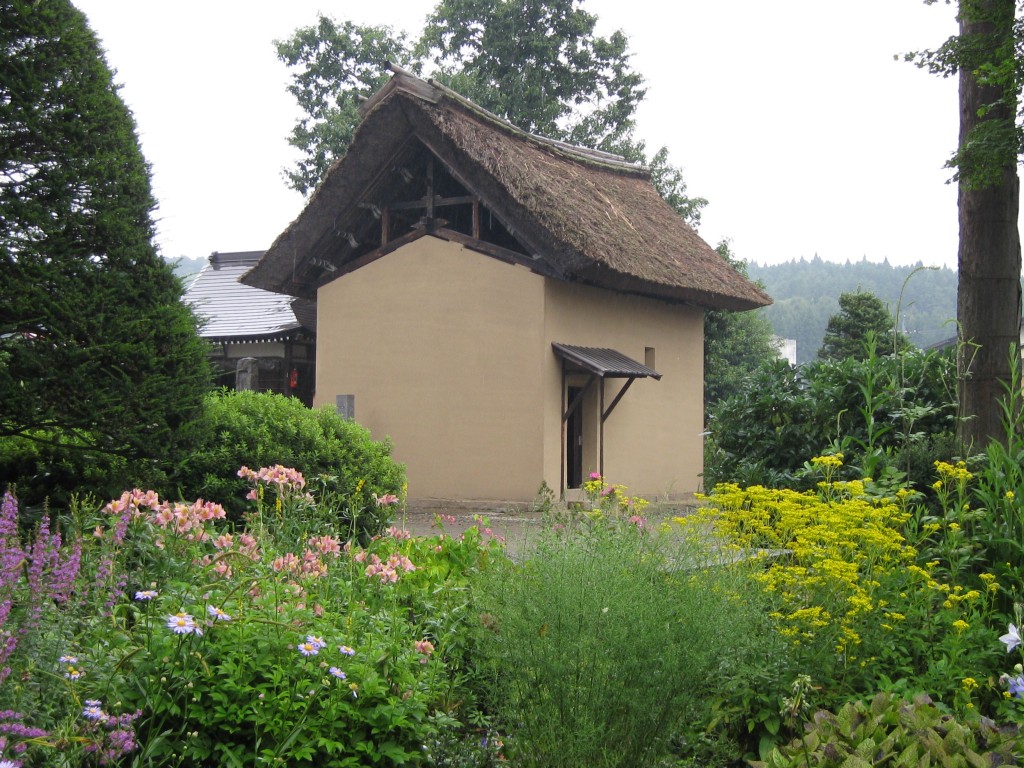
The storehouse in Kashiwabara where Issa took refuge when his house burnt down
Japan, in other words, has the answer to our century’s dilemma within its own tradition.
The people in Kobayashi’s haiku wallow in their association with the elements, the animals and the plants, even when lazy or oblivious to what surrounds them. Here he himself is blissfully unaware . . .
Asleep on my back
Midsummer clouds
Over my knees
As with the reference to the “skinny frog” above (this is such a famous haiku that Japan Post once issued a stamp commemorating it), Kobayashi often writes about the smaller and weaker animals that he relates to. It is here that his humor, an integral part of the Japanese view of nature, shines through.
Here another frog, with a little help from perspective, appears larger than life . . .
A frog in the evening croaks
Lining up its bottom
With the top of Mount Fuji
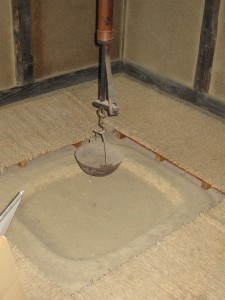
Inside Issa's storehouse, nothing but a simple hearth
He loves the birds, too, and feels for them . . .
The little orphan sparrow
Once again opens its mouth
In vain
The “once again” turns this plaintive poem into a little tragedy. Kobayashi sees himself in this light, identifying with the sparrow . . .
C’mon, play with me!
Orphan
Sparrow
In fact, it is harder to imagine a life filled with more personal tragedy than Kobayashi’s.
Born in 1763 in Kashiwabara, in what is now Nagano Prefecutre, Kobayashi lost his mother at age 3. He was brutally mistreated by his stepmother, who threw him out of the house at age 14, when he went to Edo (present-day Tokyo). He spent his youth and his early years of adulthood traveling the country, particularly to temples, making a name for himself as a haiku poet.
He didn’t marry until he was 49. His wife, Kiku, gave birth to three children, all of whom perished; and then, giving birth to a fourth, she herself died. (The fourth child, too, died, probably as a result of neglect by its nurse.)
A second marriage ended in divorce, but a third, to a woman named Yao, was happier, producing two children. But then he suffered what was probably a series of minor strokes that left him hemiplegic. Not long after that a fire destroyed his home and he came to live in the storehouse beside it, where he passed away, on Jan. 5, 1828.
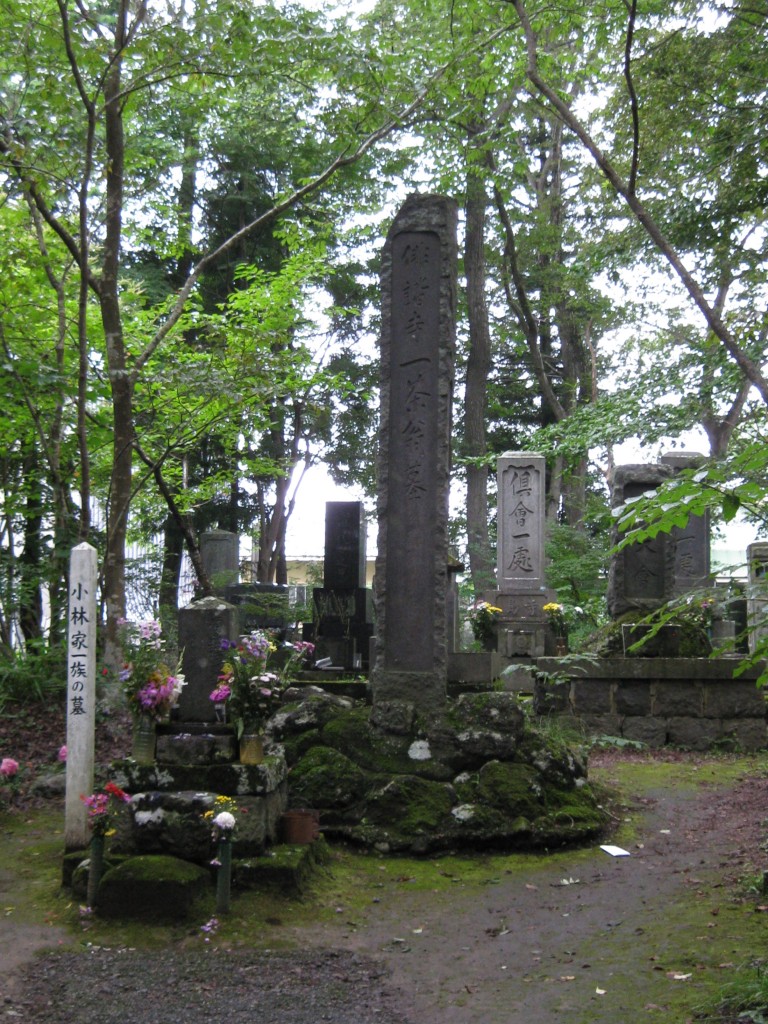
The grave of Issa at Kashiwabara
Here are some of the wonderful haiku he left us about animals . . .
I open a window
To set a butterfly off
Into the meadow
In a better world
I’d welcome more of you in my rice
Little fly
I’ll be tossing in my sleep
So, move over
Cricket
The lark cries
Around the thicket
That conceals her chicks
Each of these speaks of a love of nature in a particularly protective, melancholic or whimsical way; yet each shows respect for all creatures. Kobayashi was by no means well off, and when he went to the outstandingly scenic Matsushima islets in present-day Miyagi Prefecture, he took along some “fellow travelers” as a matter of course . . .
I’ll show you Matsushima
Then you’re on your own
Little fleas
But there is a foreboding in his work as well. The primary theme of nature is renewal; and renewal means that all things pass from this living phase of existence into another.
Kobayashi’s world view cannot be understood outside of the context of his Buddhist beliefs. There are portents of this . . .
The cow appeared
Out of the fog
Mooing and mooing and mooing
A bird is building its nest
Unaware that the tree
Is marked for felling
Despite the ever-presence of death, his faith is open to spoof and even ridicule. This makes it very different from that of most adherents to the three dominant Middle Eastern religions, who generally seem to take themselves more seriously . . .
A swallow shoots out
Of the nose
Of the Great Buddha
His comments on society are often cutting . . .
Even while strolling
Under the cherry blossoms
People lecture each other
I have made two trips to Kashiwabara [where Issa lived and died], in mid-summer and mid-winter, sitting for hours in the little storehouse that is now a museum.
I imagined that I heard his voice then, as if telling us to observe and live with nature and not destroy it.
What a world!
Even the grass that you see
Turns into rice cakes
And it astounds us, even if we are so poor as to have holes in our flimsy doors . . .
How beautiful!
The Milky Way from a hole
In my sliding rice-paper door
Kobayashi faces his own death in his haiku time and again. The most famous of these is probably this one, with its reference to his “final home” . . .
Oh well, is this to be
My final home
These six feet of snow
He wrote more than 20,000 haiku, and I have read but a fraction of these. But of those I know, the following one is my favorite, and, perhaps, the most telling of his devotion to life . . .
The fields are on fire
The birds, too, seem to be saying . . .
“Love when you can”
****************************************************************************
For more on Issa, see this page by translator David G. Lanoue: http://haikuguy.com/issa/aboutissa.html

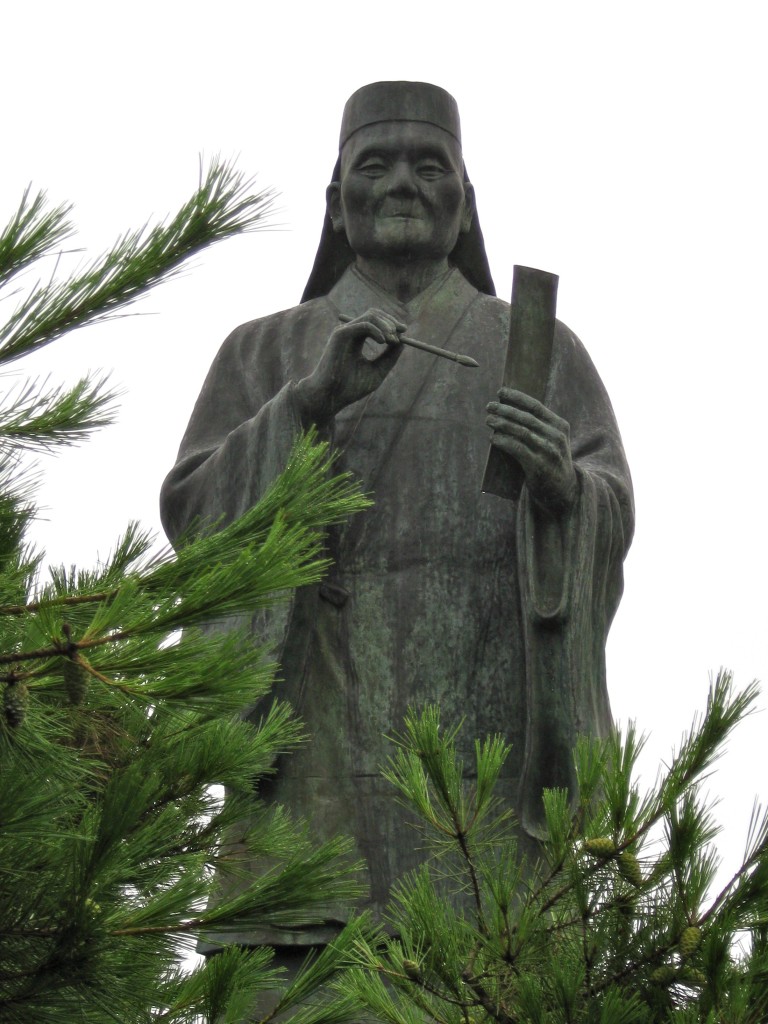
Nice post John.
I’ve long been haunted by Issa’s
The world of dew —
A world of dew it is indeed,
And yet, and yet . . .
Yes, I can imagine why…
Here’s a different translation by David Lanoue: I like the plaintive nature of that final ‘but…’
this world
is a dewdrop world
yes… but…